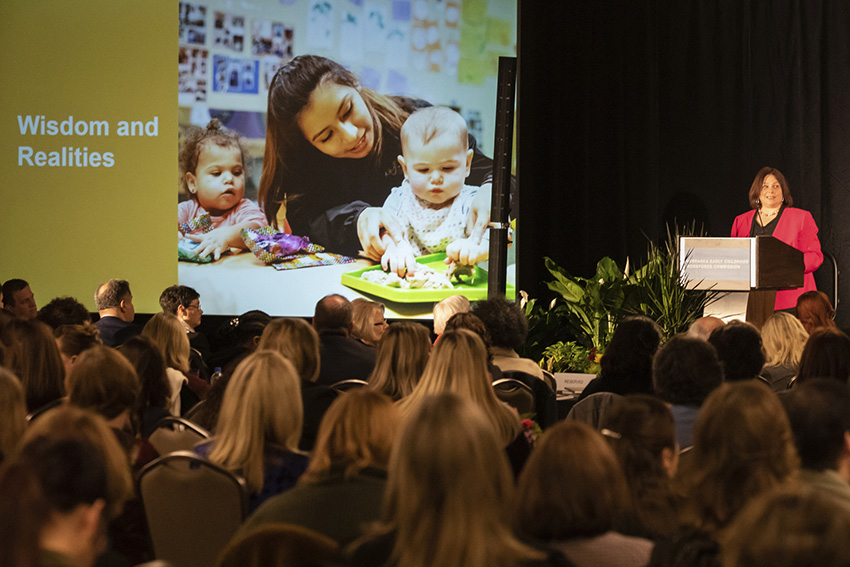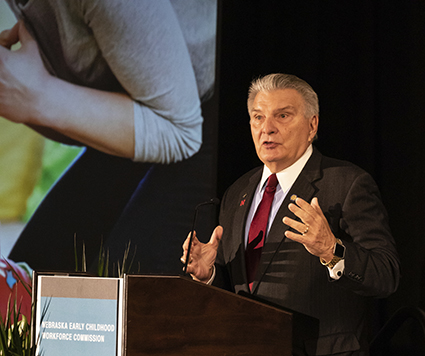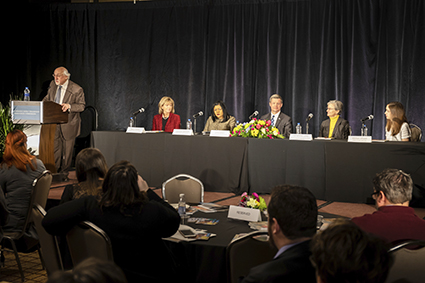 Susan Sarver, director of workforce planning and development at the Buffett Institute, provides an overview of the Nebraska Early Childhood Workforce Commission's report, which was released to the public on Jan. 30 in Lincoln.
Susan Sarver, director of workforce planning and development at the Buffett Institute, provides an overview of the Nebraska Early Childhood Workforce Commission's report, which was released to the public on Jan. 30 in Lincoln. By Matthew Hansen, Managing Editor
You sat in the room, and you could feel it happening.
The state senator who runs the Legislature’s powerful Appropriations Committee could feel it. He leaned into the microphone in front of a packed hotel ballroom Thursday morning and argued that a newly released report can aid Nebraska’s working families.
We can support working moms and dads and kids if we build up early childhood education in Nebraska, Sen. John Stinner of Gering argued. We can do it if we elevate Nebraska’s early childhood workforce.
School leaders and economic development experts and education experts could feel it, too. They once existed in their own silos, viewed early childhood education through their own interests if they considered it at all. Now they argued to hundreds in the audience and hundreds more watching online that early childhood education—quality care starting at birth—is the key to building young brains, our communities and our state’s economy, all at once. All together.
What you could feel happening during Thursday morning’s release of the Nebraska Early Childhood Workforce Commission report was the unmistakable sense that Nebraskans are coalescing around the common cause of early childhood education.
 State Sen. John Stinner
State Sen. John StinnerWhat you could feel had a word: momentum.
“I think we can execute something special in the state of Nebraska,” said Stinner, chair of the Appropriations Committee, during the rollout event.
Make no mistake: The problems mentioned by Thursday’s speakers and listed in the pages of the report are daunting.
Early childhood teachers often make poverty-level wages. Nebraska parents wait in long lines for good child care and fork over often-stunning costs when they get in. There is no good statewide system to make sure that quality care exists across home-based, center-based, and school-based centers.
“Frankly, the early childhood workforce is in trouble,” said Marjorie Kostelnik, former University of Nebraska ̶ Lincoln dean, longtime education professor and co-chair of the Workforce Commission. “Many love what they do. But they can’t afford to keep doing it.”
And make no mistake: The goals listed in the report are audacious.
The report proposes that we fully fund early childhood education in Nebraska by 2030 through increased funding from the federal government, the state, philanthropy and business. Parents would pay according to ability, based on a sliding fee scale.
It proposes that every Nebraska child has access to quality early childhood education, no matter if they live in Ashland or Alliance and no matter the child care setting. It proposes that we build a well-qualified, well-compensated workforce able to meet the daunting challenges of the 21st century.
Read the report
“Nebraskans don’t shy away from a challenge,” said Susan Sarver, director of early childhood workforce planning and development for the Buffett Early Childhood Institute. “This is a very worthy challenge.”
The report argues that meeting this challenge is possible, so long as Nebraskans themselves join together to meet it.
That’s exactly what you sensed happening on Thursday.
John Spatz, a commission member and the executive director of the Nebraska Association of School Boards, told the audience that his office sits near the Nebraska State Penitentiary. There’s a giant billboard outside advertising bonuses for prison guards.
Early childhood education has been proven to improve third grade reading scores and high school graduation rates, Stinner said earlier in the morning. And roughly 70 percent of prisoners have the following thing in common: They dropped out of high school.
Spatz said more and more school board members across the state view early childhood not as a cost, but as a needed investment.
“Common sense will tell you this. The data will tell you this. The highest rate of return for our money is in early childhood,” he said, alluding to research showing that $1 placed into early childhood education can return as much as $13 later. “Everyone wins when we invest in early childhood.”
“The question isn’t how we can afford this. The question is, how can we afford not to?”
 Sam Meisels and the Workforce Commission panel
Sam Meisels and the Workforce Commission panelTawana Grover, superintendent of Grand Island Public Schools, said school districts like hers are expected to close the achievement gaps between affluent and lower-income students, and between white students and students of color. They are expected to churn out high school graduates ready for college or the workforce. Increasingly, school leaders understand none of this can happen without quality early childhood education that gets students truly ready for Kindergarten.
“That’s how we get to students who thrive,” she said.
Early childhood teachers and child care owners on the Workforce Commission and in the audience could feel the momentum of the day, too. They said at Thursday’s rollout that, for the first time in their careers, they sense that their importance to the state of Nebraska is being properly understood.
“People want to hear the voices of those of us in the trenches,” said Mariah Stowe, the owner of an in-home child care that cares for a dozen infants, toddlers, and children and a member of the workforce commission.
“I felt like my voice was heard,” Stowe said. “That it mattered.”
Republicans talked about early childhood education on Thursday, and Democrats talked, too. North Omaha teachers proposed solutions, as did south-central Nebraska farmers. There were longtime supporters nodding in the audience and new converts to the importance of early childhood education and its workforce watching online. You can join, too, by going to earlyyearsmatter.org/workforce, signing up to learn more and be a part of the solution to Nebraska’s early childhood conundrum.
Not everyone necessarily agrees on every word in the Workforce Commission report, or how to reach its goals.
But what you feel happening on Thursday is a growing agreement that we need to work together to tackle this problem.
That we need to make early childhood in Nebraska, and the people who care for and educate our youngest minds, a higher priority in 2020 than we ever have before.
“Something important has begun,” said Sam Meisels, founding executive director of the Buffett Institute and co-chair of the Workforce Commission. “All of this is within our reach.”
Matthew Hansen, the managing editor of the Buffett Early Childhood Institute at the University of Nebraska, is an award-winning journalist tasked with telling the stories of the Institute's work and early childhood care and education in Nebraska and beyond.
His columns can be read at https://buffettinstitute.nebraska.edu/news-and-events/early-years-matter.